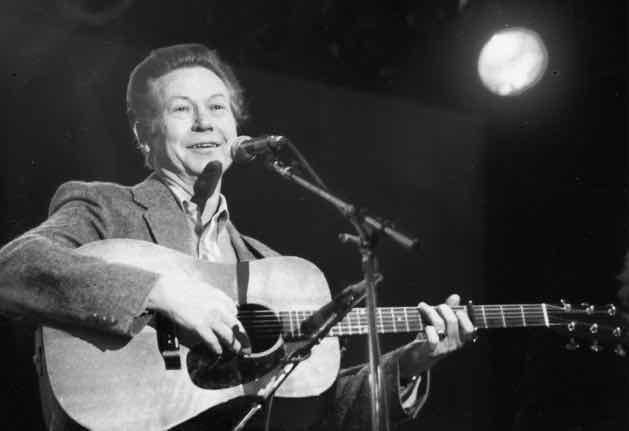
RED ALLEN
Listening to Red Allen and Frank Wakefield on “The Kitchen Tapes” is better than having the best seat in the house and better than hanging out backstage. There is none of the pressure of “performing” as these boys are just jamming, improvising, and letting go.
They have nothing to prove, moreover they have everything to gain by not playing it “safe and straight.” These guys are stretching the limits of their imaginations.
Throughout the unique session that is “Kitchen Tapes,” Red and partner Frank Wakefield explore 25 bluegrass chestnuts, including seven Bill Monroe compositions, gospel and heart songs, traditional folk ballads, fiddle (on mandolin) tunes, and five Frank Wakefield originals.
At the time “The Kitchen Tapes,” was first recorded, Frank and Red’s partnership was in its second decade and third chapter. They had teamed in the early fifties in Ohio, after recording independently for two small Bluegrass labels (Kentucky and Wayside), and again in the late fifties when they made their first records together on “Starday.” They used a studio group that included Bluegrass legends Don Reno on banjo and Chubby Wise on fiddle.
By the early 60’s both had relocated and reunited in the Washington D.C. Area where they continued touring with the “Kentuckians.” The group included at various times, Bill Emerson, Pete Kuykendall, Bill Keith, Chubby Wise, Billy Baker, Scott Stoneman, and Tom Morgan.
After Frank left in 1964, Red Allen joined forces with Bill & Wayne Yates (bass & mandolin) and former “Blue Grass Boy,” Porter Church (banjo) to form a new version of the Kentuckians based in Washington D.C. Eventually, a young David Grisman would go on to become Red’s mandolin player and produce, (with Peter Siegel), two fine albums of Red’s on the “County” label.
In 1967 Red appeared on the Grand Ol’ Opry, filling in for an ailing Lester Flatt at Earl Scrugg’s request. The following year he teamed up with J.D. Crowe, Doyle Lawson and Bobby Slone to form a Kentucky based Kentuckians that was short lived but highly influential in determining the future of two of the most important bands of the next two decades: J.D. Crowe and the New South, and the Bluegrass Album Band.
By the early ’70s Red had left the road and was producing the recordings and overseeing the talents of his own talented sons, Neal, Harley, Greg and Ronnie.
In 1987 both Red and Porter Church were invited by David Grisman to participate in his traditional bluegrass recording project, “Home Is Where The Heart Is.” The project was nominated for the first Bluegrass Grammy the following year.
In May of 1991, Red was asked to be part of a very special bluegrass reunion that David Grisman was planning.
During the sessions, Jerry Garcia dropped by to meet Red and was invited to sing a few tunes. This recording was released in 1992 by Acoustic Disc (ACD-4) and later that year nominated for a Bluegrass Grammy.
These were Red’s last recordings.